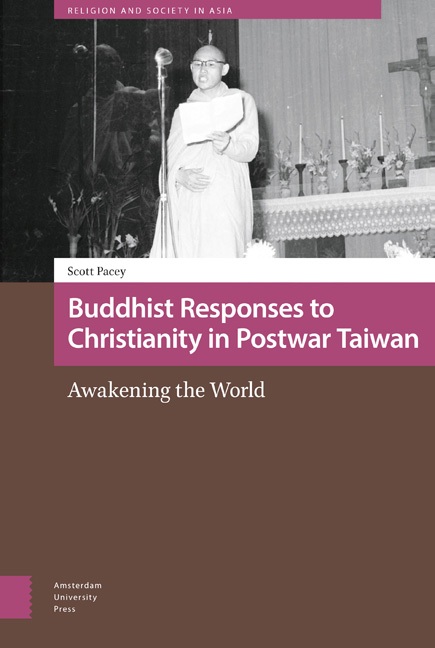Book contents
Summary
Abstract
The introduction outlines the study's historical context and main questions. Beginning with a discussion of a 1981 conference on Buddhism and politics, it asks why elite Buddhist figures, in the decade after Chiang Kai-shek's death, aligned KMT ideology with Buddhism—especially when the two figureheads of the party, Sun Yat-sen and Chiang Kai-shek, were both Christians. Stepping back, and having outlined a phase of Christian growth in the early postwar era, it then describes the party's modern Chinese cultural vision and values, which it promoted in the postwar period and which elite Buddhists aspired to in their competition with Christians for adherents. It then outlines the focus of the study: how Buddhists defined themselves as patriotic, “Chinese” and “modern”, in contrast to Christians, as a way of generating socio-political acceptability.
Keywords: identity, modernity, KMT, Sanminzhuyi, Taixu, BAROC
In 1981—the 70th anniversary year of the revolution that brought an end to dynastic China—the Buddhist Association of the Republic of China (BAROC; Zhongguo Fojiao Hui) held a conference in Taiwan. As the official body representing Buddhists on the island, the BAROC had a close relationship with its ruling political party, the KMT. An important aim of the meeting was to express support for the party and its guiding ideology—the Three Principles of the People (Sanminzhuyi; consisting of nationalism, democracy and livelihood). What is notable about the speeches given there is the extent to which presenters were willing to actually equate Buddhism with this ideology. The three principles had been devised by the party's founder, Sun Yat-sen (1866-1925), who led the movement to overthrow the Qing dynasty and establish the Republic of China in 1911-12. Although he was a Christian, speakers praised Sun and his ideological system in Buddhist terms, evoking a curious mixture of sacred and secular ideals.
For example, according to the speaker Wuyi,
only the thorough implementation of the Three Principles of the People, and the improvement of material and spiritual forms of life, accords with the needs of the Chinese people. This is also consistent with the Buddha's original intention to purify the world. Therefore, using the Three Principles of the People to unite China is a unanimous requirement of all Chinese people. Naturally, Buddhists are no exception.
- Type
- Chapter
- Information
- Buddhist Responses to Christianity in Postwar TaiwanAwakening the World, pp. 17 - 56Publisher: Amsterdam University PressPrint publication year: 2019

